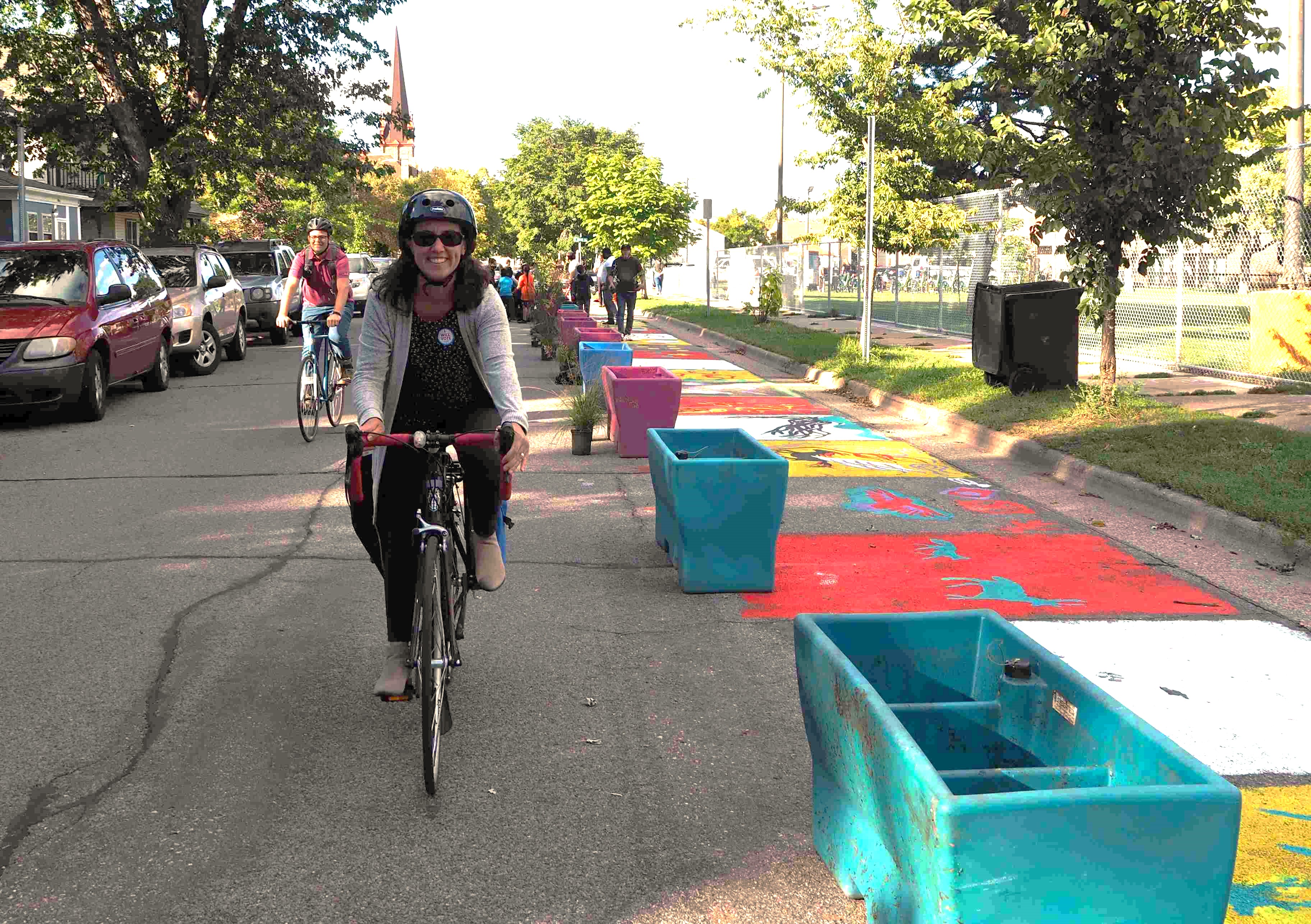Initiative history
How the program has changed (2011 - Present)
First Open Streets Minneapolis event
The Minneapolis Bicycle Coalition organized the first Open Streets event on Lyndale Avenue South. Back then, the City needed signatures from 75% of nearby property owners to approve the event on the block.
Two events
- Lyndale Avenue South
- Lowry Avenue North
Four events
- Southwest (Lyndale Avenue South)
- Northeast (Central Avenue)
- South (Minnehaha Avenue)
- North (Lowry Avenue North)
Permitting process changes
The City worked with a group called the BESE Committee and others to make a new process. This new way didn't need written approval from nearby property owners. This change was important to make things quicker and avoid spending too much time on long routes.
City Sponsorship
The City began to provide City services and support in-kind contributions for the initiative, including:
- Traffic control, detour signs, and barricades
- Police security
- Trash, recycling, and composting bins
- Event permitting
- Marketing and communications
City budgets cover these costs.
Six events
- North Minneapolis Greenway Experience
- Lyndale
- Lowry
- Northeast
- Franklin
- Nicollet
Eight events
An estimated 65,000 people attended eight Open Streets Minneapolis events in 2015.
- Lyndale
- Lowry
- Downtown
- Lake
- Northeast
- Franklin
- Nicollet
- UMN
City Council Actions of Support
We discussed how to make Open Streets Minneapolis more sustainable and transparent by:
- Establishing Open Streets Minneapolis as a City-hosted event
- Developing a Call for an Open Streets Organizer for the 2017 season
- Creating an application for route ideas and/or hosts
On December 1, 2015, the City Council resolved that the City will support Open Streets as City-hosted events in Minneapolis to further the City’s transportation, climate, and health polices and plans. This began the City Council’s role in approving the number of Open Street events and their locations.
Eight events
- Lyndale
- Downtown
- Lake
- Northeast
- Franklin
- West Broadway
- Nicollet
- UMN
Event Organizer Role Established
Open Streets Minneapolis requires a yearly organizer that manages and delivers the program. The Organizer is tasked with managing parts of Open Streets events, including permitting, assisting in route selection, volunteer coordination, and event promotion.
Eight events
- Lyndale
- Downtown
- Lake + Minnehaha
- Northeast
- Franklin
- West Broadway
- Nicollet
Winter Open Streets at Holidazzle
Call for Open Streets organizer
The City of Minneapolis released a formal call for a partner to build on the success of the Open Streets Minneapolis initiative and selection was based on the following factors:
- an understanding of the role of active transportation in economic vitality
- community cohesion and public health
- experience organizing community events with many stakeholders
- an ability to partner with the City
- an ability to attract and manage large numbers of volunteers
- an understanding of (and experience with) Open Streets initiatives
- experience encouraging and incorporating diversity in event attendees and programmers
The Minneapolis Bicycle Coalition was chosen to organize the 2017 season.
Application for Open Streets routes
The Organizer worked with us to put out an Application for interested parties. Anyone could suggest a desired route or host a route, which increased local participation and enhanced event sustainability. A selection committee reviewed and scored routes based on many factors:
- Supports the primary goals of Open Streets Minneapolis
- Connects many neighborhoods
- Includes a major urban corridor with strong destinations
- Has evidence of local support
- Addresses equity considerations
- Can complement other community engagement opportunities
Top scoring route applicants were contacted to further discuss interest and qualifications.
Seven events
- Lyndale
- Lake + Minnehaha
- Northeast
- Franklin
- West Broadway
- Nicollet
- UMN
Call for Open Streets organizer
The City of Minneapolis released a formal call for the 2018-2020 event series. Our Streets Minneapolis was selected as Organizer for the 2018-2020 event seasons.
Seven events
- Lyndale
- Lake + Minnehaha
- Northeast
- Franklin
- West Broadway
- Nicollet
- UMN + Motley
Changes due to the pandemic
The COVID-19 pandemic presented unprecedented challenges to the City and Open Streets Minneapolis. While seven events were planned for 2020, events were postponed to make data-driven cancellation decisions at least eight weeks ahead of each event. All 2020 events were cancelled to prioritize the health of our community.
Three events
- Lyndale
- Minnehaha
- West Broadway
A contract amendment to the 2018-2020 organizer agreement was extended through the end of 2021 for Our Streets Minneapolis to organize the 2021 event season.
Five events
- Lyndale
- Lake
- Minnehaha
- Franklin
- West Broadway
Call for Open Streets organizer
The City of Minneapolis released a formal call for the 2022-2024 event series. Our Streets Minneapolis was selected as Organizer.
Five events
- Lyndale
- Lake
- West Broadway
- Glenwood
- Cedar
Three events
- West Broadway
- Lyndale Ave S
- Nicollet
Call for Open Streets organizer
The City of Minneapolis released a formal call for an organizer for two events. We are looking for community partners to host an event in the Northeast and in Franklin Ave.
Contact us
Office of Public Service
Address
250 South 4th Street5th FloorMinneapolis, MN 55414Hours
8 a.m. – 4:30 p.m.
Monday – Friday
The office is not open to the public at this time.
Office of Public Service
Address
350 S 5th St
Room 333
Minneapolis, MN 55415
Hours
8 a.m. – 4:30 p.m.
Monday – Friday
Share an opinion or issue


